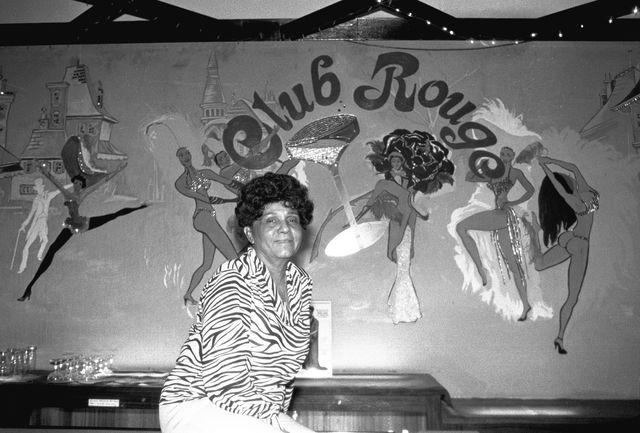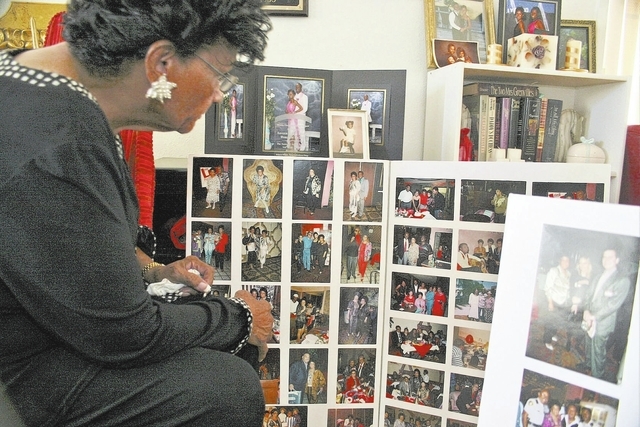Former Moulin Rouge co-owner’s autobiography in works
Local entrepreneur, civil rights activist and gaming pioneer Sarann Knight Preddy died Dec. 22 at the age of 94, but she still has quite a few tales to tell in a book she was wrapping up when she became ill around Thanksgiving.
Knight Preddy remained active in the community and her home life until her final months.
“She stopped driving when she turned 94,” said Knight Preddy’s grandson, Avree Walker. “She always had a car from the time she came to Las Vegas.”
The book Knight Preddy was working on is titled “Dr. Sarann Knight Preddy: 72 Years in Las Vegas.”
“It’s her life story, her narrative,” said historian Cynthia Cicero, who is working on the last edits of the book.
Cicero hopes it will be available to the public by Knight Preddy’s July 27 birthday, if not sooner.
“It’s so hard to say what’s in the book because she’s so varied, so diverse,” Cicero said.
The writing is finished, and the book is in the process of being laid out, with about 200 pictures chosen by Knight Preddy. The images are of her and other people in the community.
Preddy was born in Oklahoma in 1920 to a black mother and a Creek Indian father. The family moved in 1942 to Las Vegas, where Knight Preddy lived much of her life, with a short stint in Hawthorne from 1950 to 1957 to make history.
“Her husband got a job at the munition depot,” said Claytee White, director of the Oral History Research Center for UNLV Libraries. “She learned of a person selling a nightclub there and came back to Las Vegas to borrow some money from her father to buy it.”
The venue was the only one for blacks in Hawthorne. She renamed it the Tonga Club. It already featured gaming, and that necessitated acquiring a gaming license, which made her the first black woman to do so. At the time, black performers were not allowed to walk through the public areas of a casino, let alone stay inside one.
After seven years, Knight Preddy returned to Las Vegas.
“It was wonderful talking to her; she had such a positive spirit,” Cicero said. “She never let anything get in her way. She said, ‘If you don’t ask, if you don’t try, you’ll never know.’ ”
Cicero met Knight Preddy in her home repeatedly and reviewed several older interviews with her before taking the nonagenarian’s words and crafting them into chapters for the book. Cicero was impressed with Knight Preddy’s many ventures and businesses, including time spent as a keno runner, a dealer, a travel agent, a founding member of local charities and activist groups and more.
“She went to business school to become a secretary,” Cicero said. “She went to beauty school and was a hairdresser for a while. She ran for public office. She owned a dress shop. She ran a very popular club in West Las Vegas, People’s Choice. I can’t think of anything she didn’t have her hand in.”
When Knight Preddy returned to Las Vegas, she operated the Playhouse Lounge for a year before attempting to integrate card dealing in Las Vegas. The NAACP had been told that Jerry’s Nugget would hire a black dealer if that organization could provide a qualified applicant.
Knight Preddy, with her experience operating gaming establishments, fit the bill. She was hired and did well there until a new ordinance passed prohibiting women from being employed as dealers. The ordinance was soon overturned, and Knight Preddy returned to dealing at the lounge.
“She was always on the cusp of making things happen,” Cicero said. “She just wouldn’t accept that something couldn’t be done.”
She had intended to work there for only a few months to prove that point but ended up staying seven years. By the time she left, a historic meeting at the Moulin Rouge had been held, which led to the official desegregation of casinos.
“She always kept moving on,” said her son, James Walker. “She was optimistic. She never stopped. That was her strength.”
In 1990, Knight Preddy and the third of her five husbands, Joe Preddy, purchased and attempted to revive the Moulin Rouge. The effort failed but was instrumental in bringing more awareness of the history of blacks in Las Vegas. Knight Preddy later was one of the founders of the Las Vegas Black Historical Society.
In her later years, she was a frequent visitor to the West Las Vegas Arts Center, 947 W. Lake Mead Blvd., where Avree Walker is the performance coordinator.
“She was like family,” said Lisa Russell, a cultural specialist at the center. “She was one of our community elders. She was like a grandmother to me.”
Russell went with Knight Preddy many times to events, including a final visit to The Smith Center for the Performing Arts for a Nevada Sesquicentennial concert last fall.
“She was funny,” Russell said. “She cracked me up all the time. She was a jazzy dresser. She wore high heels right up until the last year. She was a joy to be around. She was supportive, down to Earth and encouraging. She was sharp as a tack until she took ill. She will be truly missed.”
Her funeral drew not only local friends and family but dignitaries and politicians from Carson City and Washington.
“She was one of those people who knew everyone,” White said. “People flew in from places like Texas and Mississippi for the funeral. When we lose a person like Sarann, we lose history. We lose a connection with the people who helped develop and grow the Las Vegas community.”
Contact East Valley View reporter F. Andrew Taylor at ataylor@viewnews.com or 702-380-4532.


















